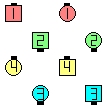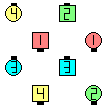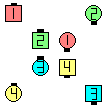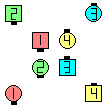From Interlocked Blocks,
Butterfly,
"O"
or other applicable formations.
Execute the given call working within Distorted Parallel Lines. At the
completion of the call, each dancer must occupy one of the footprints of the
original formation.

| |

| before
Big Block In Roll Circulate | | after
|
|

| |

| before
Big Block Trade Circulate | | after
|
|
Notes:
-
Shape-changing calls are allowed only if it is possible for each dancer to
unambiguously end on one of the footprints of the original formation.
-
For complicated calls and shape changers from Interlocked Blocks:
memorize the orientation of the diagonal, compress the formation into
Parallel Lines, do the given call, then re-establish the Interlocked
Block footprints with the original diagonal. See example below:
In the above example, imagine that you are the dancer indicated by
 .
When looking at the left-most formation, you might think
that on a Big Block Counter Rotate 1/4 you would end up in the
position initially occupied by
.
When looking at the left-most formation, you might think
that on a Big Block Counter Rotate 1/4 you would end up in the
position initially occupied by  (which, in fact, you would if
the call was Big Block Centers Counter Rotate 1/4, but
instead, because of the shape-changing aspect of the call,
you should end up on the position initially occupied by
dancer
(which, in fact, you would if
the call was Big Block Centers Counter Rotate 1/4, but
instead, because of the shape-changing aspect of the call,
you should end up on the position initially occupied by
dancer  .)
.) -
It is not always desirable to compress the formation, do the call,
and then re-establish footprints. Starting from the same formation
as in the above example, if the call was Big Block Split Counter
Rotate 1/4, it would be awkward to compress, do the call, then
re-establish. Please only use the compression method when the call
is complicated or is a shape-changer.
Variation: Big Block anything To A (Normal) Column | Line | Wave: Start the
call working Big Block but end in a normal setup (e.g., Parallel Waves).
Stagger Concept [C2]:
From an appropriate 16-Matrix formation, typically Interlocked Blocks.
Execute the given call working within Distorted Columns. At the completion of the given call,
each dancer must end on one of the footprints of the original formation.
Shape-changing calls are allowed with the restriction that it must be possible
for each dancer to unambiguously adjust to end on one of the footprints of the
original formation. As with Interlocked Blocks, the diagonal acts as the
controlling feature for re-establishing the footprints of the resulting
formation.
 .
When looking at the left-most formation, you might think
that on a Big Block Counter Rotate 1/4 you would end up in the
position initially occupied by
.
When looking at the left-most formation, you might think
that on a Big Block Counter Rotate 1/4 you would end up in the
position initially occupied by  (which, in fact, you would if
the call was Big Block Centers Counter Rotate 1/4, but
instead, because of the shape-changing aspect of the call,
you should end up on the position initially occupied by
dancer
(which, in fact, you would if
the call was Big Block Centers Counter Rotate 1/4, but
instead, because of the shape-changing aspect of the call,
you should end up on the position initially occupied by
dancer  .)
.)